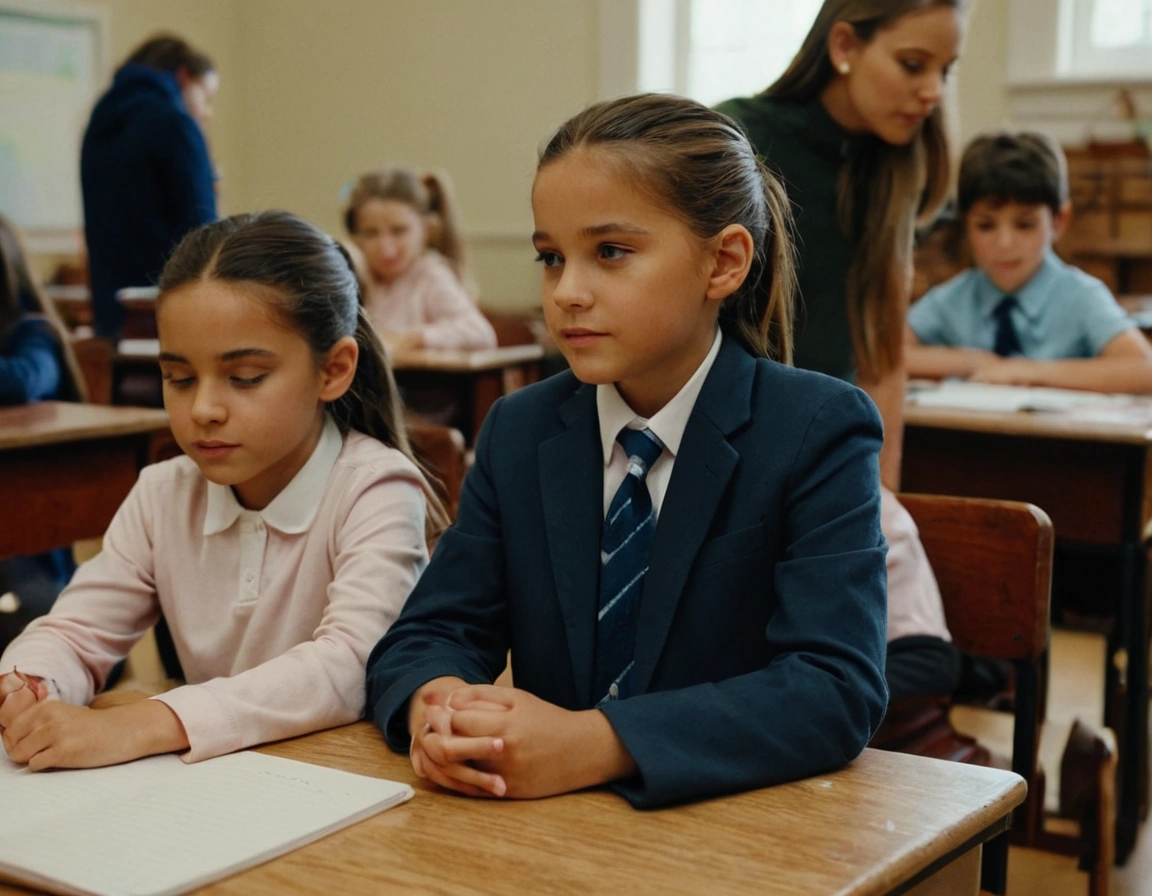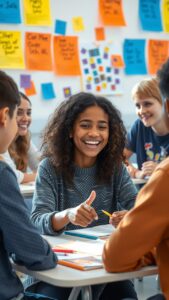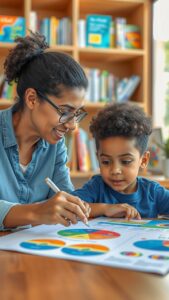Welcome to a deeper look into a teaching approach that goes beyond textbooks—experiential learning. As parents and educators, we want children to thrive, not just by understanding concepts but by experiencing them firsthand. Experiential learning transforms how children learn by connecting ideas with real-life applications, making education engaging and memorable.
In private elementary schools, where smaller class sizes and flexible curriculums are often the norm, experiential learning has the power to revolutionize early education. Whether it’s through science experiments, nature exploration, or project-based learning, experiential learning builds a foundation that fosters curiosity, critical thinking, and a lifelong love of learning. In this article, we’ll explore the specific ways experiential learning benefits young students and how private schools can make the most of this teaching style.
Let’s dive in to understand why experiential learning is not just another trend but a cornerstone of effective education.
Experiential learning is a teaching approach focused on hands-on experiences that enhance students’ understanding and retention by engaging them in the learning process. Unlike traditional rote memorization, experiential learning allows students to interact, explore, and apply knowledge in real-life settings. It is especially impactful in elementary education, where young learners benefit significantly from activities that bring concepts to life.
Private elementary schools are ideally suited to support experiential learning due to their flexibility in curriculum design, smaller class sizes, and individualized attention. As parents and educators look for methods that foster deep, practical understanding, experiential learning stands out as a highly effective approach. Below, we’ll explore seven key ways experiential learning transforms education for young learners.
1. Builds Real-World Skills Through Hands-On Learning
One of the most powerful aspects of experiential learning is its ability to connect academic content with real-world applications. For example, instead of reading about ecosystems, students can build a mini-ecosystem, observing how different elements interact in real time. This type of hands-on learning develops practical skills and a deeper understanding of concepts.
Key Benefits:
- Practical application of knowledge prepares students for real-life scenarios.
- Hands-on activities foster engagement and active participation, especially in subjects like science and math.
By giving students an opportunity to practice what they learn, they develop a foundation of skills that extends beyond academic knowledge.
2. Boosts Engagement and Curiosity
When children are actively engaged, they retain information better and stay more motivated. Experiential learning helps boost engagement by making lessons interactive and enjoyable. For instance, students can learn about historical events by role-playing or reenacting scenes, which is far more engaging than simply reading a textbook.
Key Benefits:
- Increases student curiosity and promotes exploration of subjects beyond the curriculum.
- Interactive activities encourage students to ask questions, discuss, and dig deeper into topics.
This curiosity-driven approach transforms students from passive listeners to active participants, sparking a passion for lifelong learning.
3. Fosters Collaboration and Social Skills
Learning through experience often involves group work, where students collaborate on projects, experiments, or problem-solving activities. This cooperative element not only enhances learning but also builds social skills such as communication, empathy, and teamwork.
Key Benefits:
- Students learn the value of teamwork and effective communication skills.
- Working together on projects helps build mutual respect and understanding.
By fostering an environment where students work with peers, experiential learning encourages the social development that is crucial for personal and professional growth.
4. Encourages Critical Thinking and Problem-Solving
Experiential learning teaches students to think critically and approach problems with a solution-focused mindset. Rather than following a step-by-step instruction, students are often challenged to explore multiple ways to reach a solution, helping them build critical thinking skills.
Key Benefits:
- Encourages creative problem-solving, allowing students to experiment with different approaches.
- Fosters a growth mindset, where students learn from challenges and view mistakes as learning opportunities.
Critical thinking is an essential skill for success in today’s world, and experiential learning gives students the practice they need to strengthen it early on.
5. Enhances Retention and Understanding
Research shows that active participation in learning leads to higher retention rates. In experiential learning, students don’t just learn concepts; they experience them, which solidifies memory and understanding. Activities that engage multiple senses can help students grasp and retain information more effectively.
Key Benefits:
- Improved long-term retention due to practical engagement with materials.
- Enhanced comprehension, as students can see and understand the real-world implications of what they’re learning.
By connecting learning with action, experiential education not only strengthens understanding but also helps students remember and apply knowledge well into the future.
6. Adapts to Individual Learning Styles
Every student learns differently, and experiential learning allows educators to cater to a variety of learning styles—visual, auditory, kinesthetic, and more. By using methods that incorporate hands-on activities, verbal instructions, and visual aids, experiential learning supports all types of learners, ensuring no child is left behind.
Key Benefits:
- Tailors learning experiences to fit individual student needs and strengths.
- Helps each student discover their preferred learning style, building confidence and self-awareness.
In a classroom that values experiential learning, educators can better adapt lessons to suit each student’s unique way of absorbing information.
7. Prepares Students for Future Academic and Personal Success
Experiential learning not only equips students with academic knowledge but also prepares them with soft skills like resilience, adaptability, and independence. Through active learning experiences, students gain confidence in their abilities and are better prepared for future challenges, both in academics and in life.
Key Benefits:
- Builds a growth mindset, where students become resilient and open to learning from failure.
- Encourages students to take ownership of their learning, setting the stage for lifelong success.
These skills are invaluable as students transition to higher grades and eventually into adulthood, where adaptability and problem-solving will be essential for success.
Table: Quick Summary of Experiential Learning Benefits in Private Elementary Schools
| Benefit | Description | Key Skills Developed |
|---|---|---|
| Builds Real-World Skills | Hands-on activities that apply academic knowledge to real-life scenarios | Practical knowledge, application skills |
| Boosts Engagement and Curiosity | Interactive learning that sparks interest and curiosity in students | Curiosity, exploration, motivation |
| Fosters Collaboration and Social Skills | Group projects that promote teamwork and communication | Teamwork, empathy, social interaction |
| Encourages Critical Thinking | Problem-solving tasks that challenge students to find creative solutions | Critical thinking, resilience, adaptability |
| Enhances Retention and Understanding | Activities that deepen comprehension and make learning memorable | Memory retention, conceptual understanding |
| Adapts to Individual Learning Styles | Personalized learning experiences to suit diverse learning preferences | Self-awareness, confidence in learning |
| Prepares for Future Success | Equips students with essential skills for academic and life success | Independence, growth mindset, lifelong learning |
Conclusion and Solutions for Parents and Schools
Experiential learning is more than a teaching method; it’s a path to a deeper, more meaningful education. By engaging students actively in their learning, this approach fosters not only academic achievement but also personal growth. For parents and educators looking to incorporate more experiential learning, here are a few simple steps:
- Encourage project-based learning at home, where children can experiment and create.
- Support schools in developing experiential programs by participating in educational committees or providing feedback.
- Look for extracurricular activities that use experiential learning methods, such as science clubs, field trips, or nature programs.
Experiential learning in private schools can shape confident, capable students who are ready to take on the world. This teaching style is key to making learning enjoyable and impactful, laying a strong foundation for each student’s future.




